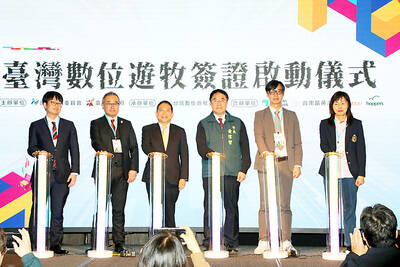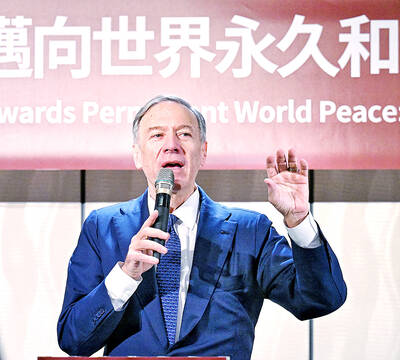Taiwan might file a complaint with the WTO against a Chinese ban on grouper imports, the Council of Agriculture (COA) said yesterday, after China claimed that it had detected the banned chemicals malachite green and crystal violet in fish imported from Taiwan.
The ban, announced on Friday and starts tomorrow, is the latest in a series of restrictions China imposed on Taiwanese farm products, including pineapples, custard apples and java apples.
Taiwan had called the bans unfair and politically motivated.

Photo courtesy of the Tainan City Government via CNA
Malachite green and crystal violet are organic dyes used to exterminate parasites and treat viral infections on fish farms. Taiwan has banned their use in the fishing industry.
COA Minister Chen Chi-chung (陳吉仲) told a news conference that the substances China claims to have found have not been detected for five years in Taiwan.
The new ban followed China’s unfounded allegations of impurities in fish imports from two aquafarms in Pingtung County late last year, said Chen, who was speaking via teleconference, as he was isolating after testing positive for COVID-19.
However, none of the claimed impurities were found at the aquafarms, he added.
Should China continue to ignore scientific evidence gathered by Taiwan, the COA might challenge Beijing at the WTO’s Sanitary and Phytosanitary Measures Committee, he said.
Grouper exports have declined during the COVID-19 pandemic, and the COA has been seeking to increase the share of domestically farmed groupers on the Taiwanese market from 30 percent to 60 percent, he said.
Beijing’s ban is at odds with the internationally accepted practice to return or destroy tainted agricultural products in such situations, Bureau of Animal and Plant Health Inspection and Quarantine Director-General Tu Wen-jane (杜文珍) said.
When Taiwanese authorities found sharpbelly originating in China to contain malachite green, no import ban was implemented, COA officials said.
The COA would first appeal the grouper ban directly, even though China has not responded to scientific data Taiwan gathered in response to last year’s bans, they said.
The Mainland Affairs Council expressed regret and dissatisfaction at the grouper ban, calling it harmful to the legitimate interests of Taiwanese aquafarmers.
“We call on China to rescind this ban to facilitate the resumption of normal dialogue and trade across the Taiwan Strait,” it said. “Allowing a technicality to affect cross-strait ties serves only to inflame Taiwanese anger at Beijing’s bullying.”
Commenting on condition of anonymity, a fish farm operator said that the import ban, although unwelcome, did not come as a surprise.
After last year’s fruit bans, “grouper farmers have expected that sooner or later, China would pull something like this... We will deal with it head-on,” they said.
Additional reporting by Chung Li-hua

ANNOUNCEMENT: People who do not comply with the ban after a spoken warning would be reported to the police, the airport company said on Friday Taoyuan International Airport Corp on Friday announced that riding on vehicles, including scooter-suitcases (also known as “scootcases”), bicycles, scooters and skateboards, is prohibited in the airport’s terminals. Those using such vehicles should manually pull them or place them on luggage trolleys, the company said in a Facebook post. The ban intends to maintain order and protect travelers’ safety, as the airport often sees large crowds of people, it said, adding that it has stepped up publicity for the regulation, and those who do not comply after a spoken warning would be reported to the police. The company yesterday said that

QUIET START: Nearly a week after applications opened, agencies did not announce or promote the program, nor did they explain how it differed from other visitor visas Taiwan has launched a six-month “digital nomad visitor visa” program for foreign nationals from its list of visa-exempt countries who meet financial eligibility criteria and provide proof of work contracts. To apply, foreign nationals must either provide proof that they have obtained a digital nomad visa issued by another country or demonstrate earnings based on age brackets, the Bureau of Consular Affairs said. Applicants aged 20 to 29 must show they earned an annual salary of at least US$20,000 or its equivalent in one of the past two years, while those aged 30 or older must provide proof they earned US$40,000 in

UNITY MESSAGE: Rather than focusing on what Trump said on the campaign trail about Taiwan, Taipei should be willing to engage with the US, Pompeo said Taiwan plays a key role in Washington’s model of deterrence against China, former US secretary of state Mike Pompeo said in a speech in Taipei yesterday. During US president-elect Donald Trump’s first term, “we had developed what we believe was a pretty effective model of deterrence against adversaries who wanted to undermine the set of rules and values that the people of Taiwan and the people of the US hold dear,” Pompeo said at a forum organized by the Formosa Republican Association. “Succeeding in continuing to build this model will not solely rest at the feet of president Trump and his team,
TECH CORRIDOR: Technology centers and science parks in the south would be linked, bolstering the AI, semiconductor, biotech, drone, space and smart agriculture industries The Executive Yuan yesterday approved a “Southern Silicon Valley” project to promote the development of an artificial intelligence (AI) and semiconductor industry in Chiayi County, Tainan, Pingtung County and Kaohsiung. The plan would build an integrated “S-shaped semiconductor industry corridor” that links technology centers and science parks in the south, Executive Yuan spokesperson Michelle Lee (李慧芝) said yesterday after a Cabinet meeting. The project would bolster the AI, semiconductor, biotech, drone, space and smart agriculture industries, she said. The proposed tech corridor would be supported by government efforts to furnish computing power, workforce, supply chains and policy measures that encourage application and integration